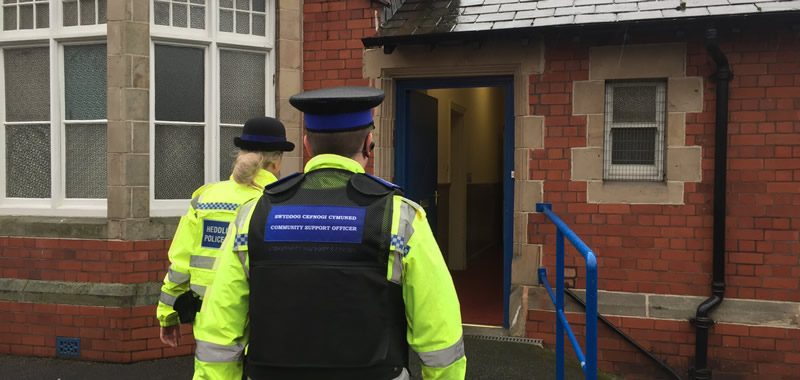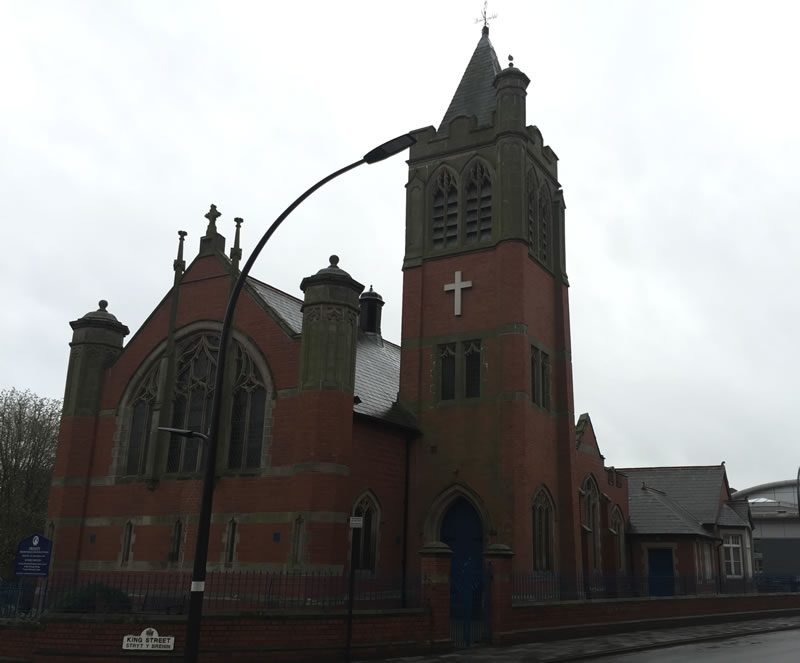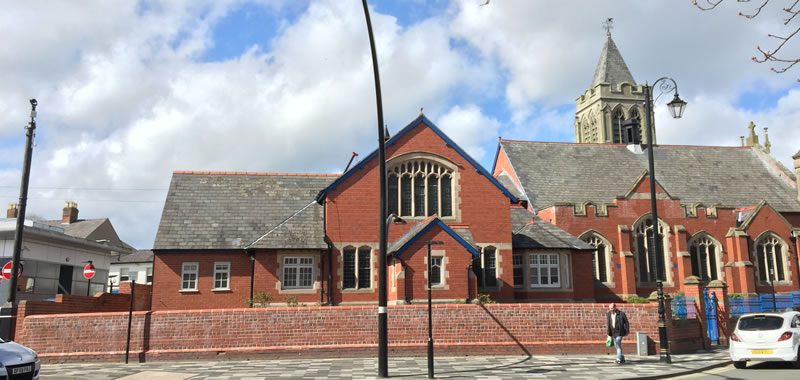Local Police Trial New Approach To Tackling Substance Misuse – Everyone In A Room Including Users

Yesterday morning a young local lad walked out of Trinity Church asking “What did I do? It was just a chat and my name on a piece of paper?!” the reply was “That is all we needed”.
Amid further headlines over visible substance misuse in Wrexham town centre, representatives from various agencies attended Trinity Church at 8am yesterday to try a new approach to the issue.
The effort was organised in reaction to what is more formally called a ‘visible vulnerable cohort’, often ‘found in crisis’ – those affected by substance misuse that are on occasion seen in and around the town centre. Locally and regionally various nicknames are used for the group, with the symptoms showing being attributed to synthetic cannabinoids such as ‘Black Mamba’.
Black Mamba, Spice, K2 and others are in their pure form liquid chemical concoctions, then often sprayed on organic material which gives it the look of more ‘traditional’ cannabis. The effects are well documented locally and nationally, with the spray production method meaning some batches can have a strength several times greater than an expected dose.
Locally we are told the synthetic cannabinoids batches have varied in strength, and are also being cut with different drugs.
The vague nature of the drugs is not just limited to the strengths, it is often unknown exactly what chemicals are in it, and therefore the effects on a person can vary greatly. One account from a Manchester drugs worker last year states: “Spice has been a big thing among heroin users in Manchester. They are using it to help them cut down on heroin, it works for them because it knocks their head off, bit like a detox, but then some have ended up getting a spice habit.
“Because some were using heroin as an anti-psychotic, it means spice has been really bad for their mental health, ended up in psychiatric units and then back onto heroin.
“Then you have what are called the ‘spiceheads’ here, these are younger people who are homeless, come out of care, I call them the Lost Boys, from unstable family backgrounds who drifted into spice addiction because it was so cheap.”
We are told currently in Wrexham £3-4 will buy you a hit, or a sachet, of an apparent synthetic cannabinoid – a significantly more accessible price point than other drugs. With the low price points higher tolerances are built relatively quickly, which can in turn escalate problems.
Although there are low end user prices the market is a valuable one, with the New York Times at the tail end of last year explaining how a kilo of core synthetic cannabinoid is purchasable for around £1500-3000, resulting in a £400,000 profit due to the milligrams used per dose.
The common outcome for a user of synthetic cannabinoid’s is mechanical movements with trance style groans and moans, a sight that has become well documented on social media via videos and pictures.
There has been documented threats made to some who have tried to help, however we are told those under the influence are often not able to control themselves, have incoherent thought processes, nor even remember any contact during that time afterwards. ‘Highs’ are often short lived, and can include cravings to re-hit.
We arrived at Trinity Church near to the bus station (used as a ‘neutral venue’) just before 8am, with various representatives from North Wales Police, partner agencies including Wrexham Council, health and third sector providers.
Wrexham.com was the only media present, although the headlines and terminology used in local and national coverage was a talking point during the morning, particularly in terms the inaccuracy and dehumanising the problems. It was also pointed out that such coverage could have a wider reputational impact for the town itself.
The primary aim of the event was to attempt to ‘gently force’ those in need of support to come into the church and interact with support workers with data collection (although it was strongly pointed out it was not an intelligence gathering exercise) and make referrals where possible, with a secondary more straightforward policing operation of enforcement taking place.
The open door group in the church was very much a grass roots style effort, with it being noted that: “Service users are part of the solution. Unless you have been there, or been involved, it is impossible to know what the problems are. Policy decisions are made in nice air conditioned offices, people talk and decide, get in their nice cars, go home have some food, watch some TV then go to bed. These guys do not.”

(Trinity Church in the 8am drizzle)
Two rows of tables were set up, with rice crispy bars and a few questionnaires on hand. Support workers from various agencies were scattered about; an executive director from Wrexham Council also popped in to observe for a while, with other council officers in attendance for the duration of the event.
The fluid plan for the day was described as ‘suck it and see’, to effectively get as many people who may need support to engage with the processes in place. The desired outcome was defined as capturing information as to who is engaging, who is not, and why they are not. The simple questionnaire asked about a person’s needs, and what they feel they need help with.
In a quick briefing the attendees were told that ‘some will want to engage, some will not, some will forget, we want to force them very kindly to engage’.
Word had apparently ‘got out’ that a ‘crackdown’ was about to take place so there was some concern that there would be no one to engage with, but within an hour eight people had entered into the process, perhaps unwittingly, seeing it more as a chance for a cuppa and a chat.
Police did point out that if anyone was already under the influence a decision to enforce, or triage a person would take place. On the former people would be taken to custody, and on release part of their conditions would involve being signposted to Trinity Church.
Six people were arrested over the course of the day for ‘drug induced antics’ in the town centre with five charged to court, although none connected to the event itself.
The people coming through the doors were like you – young, old, male and female. As one person observed, if someone in nice shoes, smart jeans and a shirt is passed out on the floor in the early hours it is often laughed off as a good night – but those who are visibly less clean, and are in the town centre during office hours in a similar state are treated differently by society.
The recent Psychoactive Substances Act made the previously known ‘legal highs’ illegal, with new legislation introduced to target the production and supply of such substances. It attempted to close a loophole on previous law which saw a drug get outlawed, but then a tweak to the chemical formula would then make it legal.
Wrexham has seen some local versions of different legislation enacted, with a Public Space Protection Order (PSPO) covering the town centre prohibiting people ‘loitering in a state of intoxication or through drug induced activity’. The PSPO also includes banning ‘inhaling, injecting, smoking or otherwise using any intoxicating substances’. Enforcement of the PSPO was highlighted by local MP Ian Lucas a few months ago, with comparisons on numbers of fines and tickets issued by police and the council.
Inside and outside Trinity Church the view appeared to be that the PSPO can be a useful tool in some circumstances, however arresting and prosecuting some users of synthetic cannabinoids was essentially pointless.
Drug tests on £3-4 bag samples to definitively identify a substance costs around £120. The legal time and effort place in preparing for a hearing, let alone time at the already hard pressed Magistrates Courts all to issue a comparatively low fine (as it is non custodial) to an individual who is unlikely to have the ability to pay, did not appear to be a sensible solution.
There is a possibility several months later that someone could be jailed for unpaid fines, but usually that is when the amount due hit the thousands, and results in a few days or weeks in custody.
We were repeatedly told that ‘legislation cannot keep up with the tweaks in cannabinoids’ and that the issue needs to be treated ‘as the epidemic it is’ at a Welsh Government and Westminster level. The issue was described as large as the initial spikes in heroin and ecstasy in the 1980’s, and co-ordinated responses and funding are required.
Where and what those responses should be still appears to be unknown at every level, with it made clear several times that traditional drug prevention and support tactics simply ‘are not fit’ for the new synthetic cannabinoid problem.
Mental health treatment was referenced many times by those attending, with some trapped in a vicious circle where they could not access mental health support services due to their drug use, however they were using drugs for mental health reasons. Similar situations were recalled where drugs prevented access to some homeless services, but it was felt access would lower the use of drugs.
On a local level there was some acknowledgement that finger pointing had been taking place, and our own observation that if a stakeholder was not in a meeting we had sat in they would be the ones likely to take the blame was not challenged. It was clear that a parallel goal of the day was to get the various agencies in a room as well, as it was explained ‘it is very hard for someone to say no if they are looking you in the eye’.
The organisation of the day was led locally by North Wales Police, perhaps in response to criticism over the policing of the problem, or as an indication of the frustration of unsustainable allocation of their resources on dealing with the results of the substance abuse with no solutions in sight.
The learning and data collection from the exercise is hoped to be useful in a practical sense, but also to help shape higher level decision making. It was pointed out that those interacting on a day to day basis with service users ‘have the appetite to fix the problems’ but often funding or direction from above does not always enable that.

(Trinity Church a day later with brighter skies overhead)
Thirty five people engaged with the process on the day, with more people through the door who are hoped will engage next time.
Sgt Victor Powell told us how he was pleased with the ‘wealth of information’ gained by all taking part, and that service users were offered information on what they hope their end goals would be.
In terms of service providers and various stakeholders it appears the event was equally positive, “It was a really successful day in opening doors between partners themselves, and it opened doors between service users and service providers.”
We did enquire why such an approach had not been taken earlier, Sgt Powell told us: “On the surface it is a traditional problem, so traditional policing methods have been applied. There is a lack of understanding nationally and varying degrees of understanding at a local level over New Psychoactive Substances. Organisations involved have to recognise we have to adopt a new approach to what is a relatively new phenomenon.”
It is expect a similar day will be held in four to six weeks time, and could become an ongoing part in dealing with both the causes and effects of the synthetic drugs locally. Sadly in a message that is likely applicable across the UK, it was said “We are not fixing it today or in six weeks”.
Spotted something? Got a story? Email [email protected]











